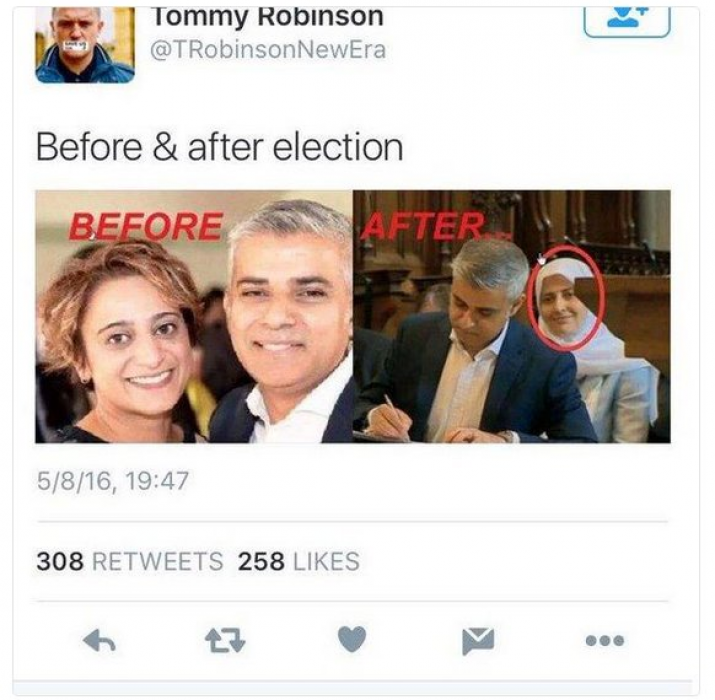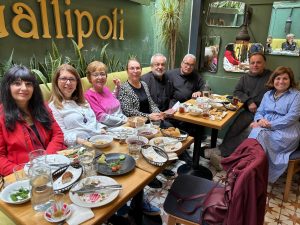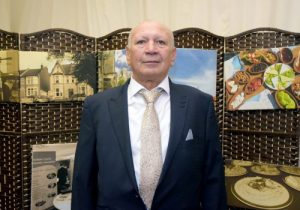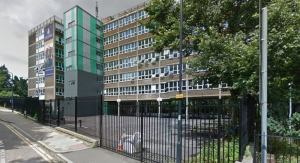‘’First Muslim Mayor of London’’ or ‘’Khan of Londonistan’’
by Gunel Ahmedova
‘’Fish and chips I am going to miss you, you are not halal.’’ a social media user.
On May 6, 2016 London elected its first British Muslim Mayor – Sadiq Khan. Both nationally and internationally this was seen as being of ‘great symbolic importance’. Since, interestingly and paradoxically, Khan won in spite of the rise of Islamophobia across Europe and the UK. Khan not only successfully out-pointed his nearest rival, Jewish businessman Zac Goldsmith but five other candidates.
In response to the appointment of the latest London mayor, commentators initiated a trend on social media that Londoners could expect to see the new ‘Islamic Mayor of London’ open more halal shops across ‘Londonistan’ during his tenure than his predecessors. And neither should Londoners be surprised if the capital became flooded with mangoes from Pakistan, which is the root of Khan’s ethnic heritage, and the popularity of cricket is given a boost.
Sections of the media have welcomed Khan’s election cautiously. News reporter Ashitha Nagesh wrote recently for The Metro, that ‘the press is quite taken with Sadiq Khan. And by ‘quite taken with’, we mean ‘a little bit obsessed with the fact that he’s Muslim’.
It raises questions why there has been a concentration of attention placed on Khan’s background, faith and ethnicity. Why being a Muslim matters. Would the media write the same unnecessary headlines if Goldsmith was elected? Would run the headline as the ‘First British Jew’ as mayor? The huge influx of refugees into Europe together with increasing attacks on Western civilians on in the name of ISIL has motivated some political leaders and opinion makers to curtail rights and try to depict Muslims as scapegoats and this has caused anguish in the Muslim community.
 The role of the media cannot be taken too lightly. It has been and is a powerful divisive tool that can create and stir prejudice. It can use its reach and resonance to amplify hate speech against Muslims. It can also appease, calm and contextualise and promote objective editorials. It has been hard to pin down the trigger and motivation behind the more negative reporting that has driven certain sections of the media to take an aggressive and less conciliatory stance towards British Muslims.
The role of the media cannot be taken too lightly. It has been and is a powerful divisive tool that can create and stir prejudice. It can use its reach and resonance to amplify hate speech against Muslims. It can also appease, calm and contextualise and promote objective editorials. It has been hard to pin down the trigger and motivation behind the more negative reporting that has driven certain sections of the media to take an aggressive and less conciliatory stance towards British Muslims.
WHO IS SADIQ KHAN
Born in Tooting, Sadiq Khan is one of eight brothers and a sister. His father was a bus driver and mother, a seamstress. Both were immigrants from Pakistan. The family lived in a three bed council house, the children attend state schools. Prior to being elected as the Labour MP for Tooting Khan practiced as a lawyer defending human rights. He held two ministerial posts. The first as Minister for Community Cohesion, working to promote greater understanding, including tackling anti-Semitism & Islamophobia with people of all faiths. Khan was later made Minister of Transport where he became the first Muslim and first Asian to attend Cabinet. (Source: Sadiq Khan for London).
[one_half last=”no”]
In 2015, Khan, along with over 100,000 others, supported a campaign to demand that the UK welcome more Syrian refugees. He tweeted a picture of himself with a ‘refugees welcome’ sign.
[/one_half]

‘’ I am a Londoner, I’m European, I’m British, I’m English, I am of Islamic faith, of Asian origin, of Pakistani heritage, a dad, a husband’’ he said to the New York Times on 30 April, 2016.
The increasing alarm and unrest on issues concerning religion and ethnicity had been a feature that overshadowed Khan’s mayoral campaign. Khan was accused of giving Muslim extremists ‘oxygen and cover’ by contender, Zac Goldsmith. And Prime Minister David Cameron during the PMQs on 20 April, also alleged that Khan was unfit for office because he had shared a platform with ‘’extremists’’.
Khan countered by accusing his rival of trying to ‘scare and divide voters’. Yet despite these divisive allegations, Khan attracted 44% of first preference votes. His nearest rival, Goldsmith accumulated only 35%. By portraying himself as a ‘British Muslim’ champion ‘who will take the fight to the extremists’ resonated well with his constituency of 8.6 million residents, of which over 1 million are Muslims. Khan, acknowledged in his victory speech that Londoners chose “Hope over fear” and “Unity over divisiveness.”

‘’Such smear-by-association has become all too common for Muslims and Muslim organisations. It is a cancer blighting sections of our political and media class and has infected the solemn business of government.” the Muslim Council of Britain Secretary General said in his congratulation message.
The British columnist for The Guardian, Owen Jones recently wrote ‘Goldsmith waged a campaign soaked in racism, in one of the most ethnically diverse cities on Earth, shamelessly exploiting anti-Muslim prejudices in an effort to secure a shameful victory’. Jones went on to say that Goldsmith was a candidate that ‘exploited and incited prejudice and hate. ‘’He undermined community cohesion. He indicated to young Muslims that there was no point engaging in the democratic process, because even the most progressive Muslim would be treated as aiding and abetting extremists. And in doing so, Zac Goldsmith became a recruiting sergeant for the very extremists he attempted to smear Khan with’.

Britain First candidate Paul Golding who turned his back during Khan’s victory speech posted a video where he apologies in advance for election results saying “Immigrants and Muslims have all moved in. Whole swathes of the city now are completely colonised. And if you look at places like East London now they are all mini Sharia states”. (Photo: Mirror, 7 May, 2016)
Khan is not a stranger to racism and has found himself a victim when he was racially abused by supporters of his own team. He later seized the initiative to challenge football to ‘call out racists’.
Yet, Khan in 2013, voted in favour of same-sex marriage and he is known to be a supporter of Israel. During his campaign Khan was cited as saying ‘’I’m the only candidate who, when he stood for Parliament in 2005, had protesters outside my mosque telling people that I was an apostate, and that anybody that voted for me they would go to hell. But why did I do it? Because I believe in equality”. To those that denunciate Khan as being an apologist for extremists – Khan has a fatwa against him.
A last minute anti-Semitism row triggered by comments allegedly made by Ken Livingstone, a fellow Labour party associate threatened to disrupt Khan’s campaign. Khan managed to distance himself from any anti-Israel sentiments and as his first official Mayoral act, Khan attended a Holocaust memorial ceremony in north London to show his unity with the Jewish community.

On the issue Muslim women wearing hijabs and niqabs, Khan was quoted as saying that this was “a question to be asked”. This stance is an indication that Khan holds fairly liberal and open minded views on this topical issue. Perhaps his wife and daughter have both been instrumental in moulding his more moderate outlook.

However, despite of his moderate views people still tried to ambush Khan. The most infamous being Tommy Robinson, leader of Pegida UK, an anti-Islamic, anti-immigration, far right movement.
Robinson mistakenly tweeted a photo of Khan’s ‘wife’ and tried to imply she had deliberately misled voters by not wearing a hijab until after the elections.
In fact the photo was of Sarah Joseph OBE, Labour supporter and celebrated for her services to interfaith dialogue and the promotion of women’s rights and not Saadiya Khan.
WHAT DOES SADIQ KHAN’S VICTORY MEAN FOR BRITISH MUSLIMS?

Many expressed pride in a diverse UK. According to Khan, his election victory will send a clear message that, in spite of the ‘haters in Iraq & in Syria’ and controversy that eclipsed his campaign, London is not anti-Islam and remains a beacon of tolerance and respect. And there is emerging a renewed optimism that Khan’s election as mayor will be a turning point towards better cultural relations within the UK. It will build confidence within the Muslim communities that have for a long time felt politically restrained and help change the mindset that ‘Islam is terrorism’. (Photo: London Muslims Facebook)
BRITISH MUSLIMS
According to the Muslim Council of Britain there are at least 2.7 million Muslims in Britain, with around half being British born Muslims. The Muslim community in the UK is considered to be well integrated into British society when compared against other European countries also with significant Muslim communities. However, there has been increasing scrutiny directed at European based Muslim communities especially following two devastating terror attacks in Paris and then in Brussels by Islamic State.
Two months after Khan was first elected as a MP in 2005, London was the victim of a terror incident. The attack was indiscriminate and killed Londoners of all faiths and those with none. In his article published in the Guardian newspaper titled ’Fairness, not favours, for Muslims’ acknowledge and explained that he had responsibilities as a Muslim MP and alongside “three other British Muslim MPs and I were expected by the government, media and the Muslim community to play our part in the capital’s calm and unified response”.
The UK Prime Minister has been accused as being politically indelicate. The shadow Home Secretary, Andy Burnham said that in his desire to make headlines Cameron risked “doing more harm than good” by singling out and stigmatising Muslim women. Burnham was referring to the Prime Minister’s plans revealed earlier this year to help migrant spouses to learn English to stop extremism and that they risked deportations if they failed English language test. Burnham said Cameron’s “clumsy and simplistic approach to challenging extremism is unfairly stigmatising a whole community. There is a real danger that it could end up driving further radicalisation, rather than tackling it”.

Cameron speaks with women attending an English language class during a visit to the Shantona Women’s Centre in Leeds. Photograph: Shutterstock
Sharing a platform with Iman Suliman Gani, a Tooting based preacher is among the activities Khan has been accused of doing. This accusation is significant because it was made by the Prime Minister against a British citizen and that the accused, Imam Gani, “supports ISIS”. This allegation was later reinforced by the Defence Secretary, Michael Fallon. However, the Mirror an article published on 3 May asserted that Cameron’s claim was not based on fact.

Khan’s former brother-in-law, Makbool Javaid, has also been accused of having extreme views.
In April, Trevor Phillips, former head of the UK Equality and Human Rights Commission presented findings of a survey in a Channel 4 documentary titled ‘What British Muslims Really Think,’ The significance of the documentary was that the survey had been carried out face-to-face to better understand why young Muslims were being drawn towards using violence. The results of the survey revealed that: a large majority (94%) of British Muslims felt that they are able to practice their religion freely in Britain; 88% of British Muslims thought that Britain is a good place for Muslims to live; 78% of British Muslims wanted to integrate into British life on most issues with the exception of Islamic schooling and some laws. The survey also found that: nearly 25% supported Sharia law; 4% sympathised with terrorism; and 52% thought that homosexuality should be illegal.
Trevor Phillips: “The integration of Britain’s Muslims will probably be the hardest task we’ve ever faced. It will require the abandonment of the milk-and-water multiculturalism still so beloved of many, and the adoption of a far more muscular approach to integration.”

Photo: Internet (Muslim women)
Critics of the Channel 4 programme pointed out the flawed the methodology for this survey was likely to divide opinions rather than united and foster understanding. Critics said the survey did not and could represent, despite the title, what British Muslims thought. One commentator said ‘’intolerance falls away when you have inclusion, prejudices can evaporate in contact with other people and with the understanding on both sides that integration is a two-way process”. But the way that Philips presented the ‘facts’ implied that all the Muslims that took part held the same views and that there was little value in engaging further. This prejudgment and “constant negative press about the Muslim community will feed polarisation” instead.
Drawing on census data the Muslim Council of Britain compiled a report titled British Muslims in Numbers. It distilled social, economic and health profiles and found that on average British Muslims: more likely to live in poorer areas, in housing, have worse health and be economically inactive. Those working were lower-skilled and lower-paid. British Muslims were unlikely to marry outside their faith or have significant friendships with non-Muslims. They were also likely to face abuse, prejudice and discrimination that non-Muslims did not.
According to the Islamic Human Rights Commission ‘’ Environment of Hate: The New Normal for Muslims in the UK’’ study issued in November, 2015 “Muslims in the UK feel targeted by media and political institutions, which in their understanding contribute heavily towards a deteriorating climate of fear, a rise in far-right groups and a rise of anti-Muslim racism. Most Muslims now feel they are hated’’.
Tell MAMA, a national project which records Islamophobia and measures anti-Muslim incidents in the UK revealed that from July 2014 to July 2015 there had been 816 Islamophobic offences recorded across London. A 70% rise over the previous reporting cycle and women wearing veils being most vulnerable.
Very recently, the British Police came under fire for using a fake ‘Muslim terrorist’ and the phrase “Allahu Akbar” at a counter terrorism training exercise in Manchester because it could have been seen as stereotyping Muslims and fuelling Islamophobia. Miqdaad Versi, from Muslim Council of Britain, told Al Jazeera that “by using ‘’Allahu Akbar in the terror training, Muslims around the world are being associated with terrorists”.
An article titled ‘With Islamophobia on the Rise I Fear for My Friends And Family’ written by Khan in the Guardian stressed that Islamophobia made Young British Muslims more susceptible to radicalisation and extremism. He highlighted that British society is too segregated and this did not give mainstream Muslims the confidence to challenge extremist. Khan said “We must take Islamophobia seriously, because it’s not just Muslims that are at risk – it’s all of our safety’’.
According to the Human Rights Watch (HRW) Executive Director Kenneth Roth scapegoating Muslims hurts and alienates populations crucial to counterterrorism efforts. HRW’s the most recent ‘’World Report 2016’ says: Hate crimes against Muslims are a serious problem, with spikes in incidents reported in France and the UK. The acceptability of intolerance against Muslims was demonstrated in September when several EU leaders said they only wanted Christian, as opposed to Muslim, refugees in their countries’’.
Reaction on Khan’s election
Not surprisingly, even post mayoral election Khan’s faith, his Muslim-‘ness’ continues to dominate the news and potentially inflame tensions. The Independent newspaper exclaimed that the ‘With Sadiq Khan’s victory so emphatic the message is clear: London is in the grip of terrorist sympathisers’
Some of the less complementary reactions to Khan’s appointment as mayor have been likened to the response that US President Obama faced when he was elected.
Although he has since changed his tack and would make an exception for Khan, Republican Presidential hopeful Donald Trump had previously endorsed a blanket ban on Muslims entering the United States.
Commentators on social media have tried to discredit claims of Islamophobia by claiming Khan’s victory was due in part to the substantial proportion of Muslims resident in London.
A variety of pro/negative sensationalist taglines have started to trend. Banners like the ‘Islamisation of Britain?’ and ‘West London is now known as Islammersmith’, or ‘London has rejected Islamophobia and accepted Islamification’ using #Londonhasfallen hashtags have tried to shade and split opinions. Others call for the ‘Domination of the world by Islam’ and for all Muslims to ‘Dismantle western governments and establish an Islamic State, or Khilafah’ or claim that ‘England will soon become a Muslim country’ because a known anti-Semite Muslim has become the Mayor of London.
Others users of social media have used statistics to prove that ‘White Brits are now in a minority in London, making up just 45% of its residents, Muslims are present in all regions of England and Wales, but London has the highest population of Muslims. They say Islamophobia in rise, so why then half of the population of the Middle East is trying to come here, often illegally? Surely it can’t be for our benefits alone’’.
Another social media user commented: ‘’I watched Sadiq Khan’s inauguration as Mayor of London and witnessed a Christian leader welcome a Muslim Mayor. Perhaps one day there will significant tolerance to also see a Christian, a Jew, or an atheist be the mayor of a major city in the Islamic Republic of Iran, Pakistan, or in Saudi Arabia – let alone the son of a bus driver. ‘’ This prompt another user to post on Facebook a list of some Christians who lead the Muslim dominated cities. Mrs Februniye Akyol, a Christian co-mayor in Mardin city of Turkey is one of them.
Attention has been also drawn to the fact that Muslim political leadership is not a new or novel feature for Europe. London may have its first Muslim Mayor but as, History Professor Juan Cole points out in a recent 7th May article that Islam has been an integral part of European history that spans almost 1,300 years and significant parts of continental Europe has been under Muslim rule at some point. According to Cole ‘Sadiq Khan has many illustrious predecessors among European Muslim urban leaders’ and that Londoners / Europeans should ‘not exacerbate the weird amnesia of Europe about how central Islam and Muslims have been to its history since the eighth century’.
Khan’s election as Mayor of London set and broke two milestone records: he is London’s first British Muslim and British Asian mayor and he won the election with a landmark majority giving Khan the biggest mandate over all his predecessors.
Khan election is unlikely to be the solution to anti-Islamic feelings. There will still be sections of the British Muslim community that will feel marginalised and sections of the non-Muslim community that will still foster prejudice and distrust. However, Khan has a unique opportunity to use his leadership to help bridge differences, encourage more open talk and genuine engagement that will hopefully increase understanding, integration and tolerance amongst those with more ingrained views.









